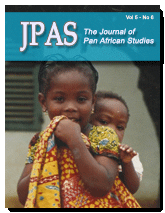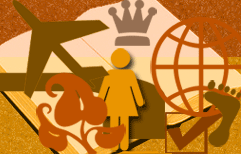ARCHIVE ISSUE
 Volume 5 • Number 6 • 2012
Volume 5 • Number 6 • 2012
On the Cover: Little Sister
● Letter to the Editor
[ view PDF ]
● Social Control and the Health of African American Boys and Men: Introduction and Current Statistics (Guest Editorial)
by K. Tutashinda
[ view PDF ]
● Why I Write About Ibadan
[ view PDF ]
An interview with Dr. Toyin Falola of the University of Texas at Austin by Tokunbo Olajide held at the University of Ibadan wherein Falola discusses his scholarship and the state of Nigeria.
● Grass Tops Democracy: Institutional Discrimination in the Civil Rights Violations of Black Farmers
by Spencer D. Wood and Cheryl R. Ragar
[ view PDF ]
This article situate the civil rights violations of the Pigford v. Glickman, USDA lawsuit within a larger intersecting system of land, racial inequality and white normativity to show how land as a material basis of wealth has been disproportionately inaccessible to African Americans while simultaneously serving as a key form of wealth for upward mobility for white Americans.
● The Haitian Turn: An Appraisal of Recent Literary and Historiographical Works on the Haitian Revolution
by Celucien L. Joseph
[ view PDF ]
This essay is a critical evaluation of recent literary and historiographical scholarship on the Haitian Revolution, and thus reflects on the significance of the Revolution as a historic world event as well as a reference point for thinking about freedom, universal human rights, social justice and equality.
● Free Space and Inner Space: A Place for Reconstructing Self and Other
by April Bernard and Onwubiko Agozino
[ view PDF ]
The concept of "free spaces" and their potential for mobilizing individual and collective action for change is explored in this paper as a tool for reconstructing inherited ideologies that shape the experiences of African Diasporic women and men in their daily public and private lives. This analysis also includes a discussion of the limitations of the liberal Western feminist approach to social change and justice and proposes the use of the concept of "free space" at the micro, mezzo and macro-levels of society as an African-centered and more specifically an Africana Womanist tool for the reconstruction of personhood, gender ideologies, relations, norms, policies and communities.
● Appropriating Globalisation to Revitalise Indigenous Knowledge and Identity Through Luhya Children's Play Songs
by Vicky Khasandi-Telewa, Rosemary I. Liguyani and Sheila Wandera-Simwa
[ view PDF ]
This paper explores the indigenous ways Luhya children passed their free time by engaging in play songs, simulations, poetry and similar activities, and argue that in Kenya, they want to embrace what is useful in globalization, however they want to also retain and revitalize the indigenous ways of education and play that give children a greater sense of self and group identity.
●Global Economic Challenges: Trade Union Growth Implications In Nigeria
by Toyin Adefolaju
[ view PDF ]
This paper thus examines the world/Nigerian economy and concludes that it has impacted adversely on Trade Unions' ability to organise effectively.
●Aso Ebi : The Dynamics of Fashion and Cultural Commodification in Nigeria
by Ajani O.A.
[ view PDF ]
Using archival records, books, journals, interviews, observation and oral tradition, this paper tests the thesis that socioeconomic development is linked with massive cultural change and the persistence of distinctive cultural traditions and therefore critically examines the origin and functions of aso ebi as a social phenomenon for solidarity and identity among family and friends; and explores emerging problems and benefits associated with cultural commodification in a rapidly changing society.
● Books Available for Review
[ view PDF ]
● Books of Interest
[ view PDF ]
● Announcements
[ view PDF ]



